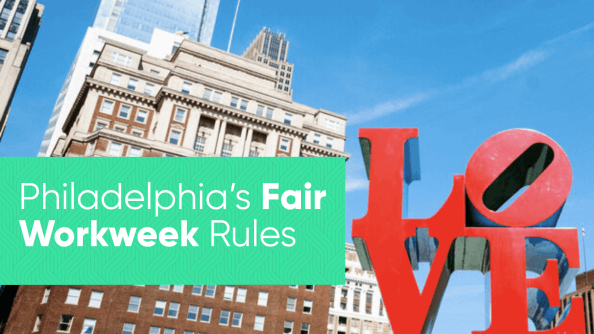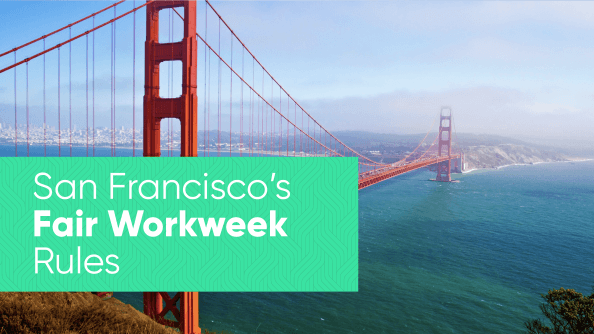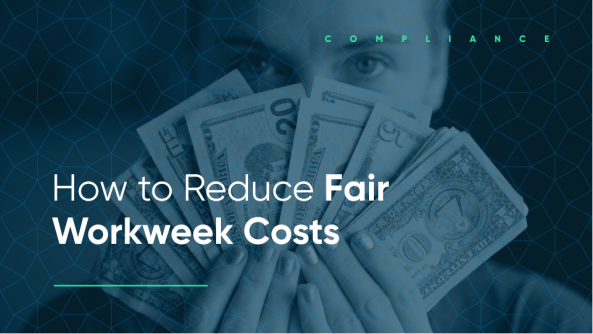Fair Workweek: Do the Laws Apply to Me?

- By Harri Insider Team | January 19, 2021
Fair Workweek labor laws contain a complex set of rules and regulations that cover most service-based businesses including hospitality, retail, and grocery. And while the laws themselves are a complex operational puzzle, figuring out if your business is required to comply with Fair Workweek can be equally as challenging.
Fair Workweek eligibility requirements typically cover these 3 categories:
- Business type
- Employee count
- Location count
But those criteria can be even more specific. A business’ total employee count may need to work out of a certain location in order for them to be Fair Workweek-eligible. Location requirements may differ depending on industry type, and things can get even more confusing for franchises.
We’re here today to cover a list of Fair Workweek requirements by city and state so you can stay fully compliant no matter where your business operates.
List of Fair Workweek requirements by state and city
NYC Fair Workweek requirements
NYC Fair Workweek covers businesses that meet the following criteria:
Fast food: Have 30 or more locations
Retailers: Have 20 or more employees
Chicago Fair Workweek requirements
Employees working under the following industries are covered under Chicago Fair Workweek:
- Building Services
- Healthcare, Hotels
- Manufacturing
- Restaurants
- Retail
- Warehouse Services
Chicago Fair Workweek covers businesses that meet the following criteria:
Restaurant industry: Have 250 or more employees and 20 or more locations
Other covered industries: Have 100 or more employees globally
Employees must make less than $26/hr or less than $50,000/yr to be covered under Chicago Fair Workweek.
Philadelphia Fair Workweek requirements
Philadelphia Fair Workweek covers retail, hospitality, and foodservice employees when an employer fulfill both conditions:
- Has 250 or more employees
- Has 30 or more locations globally
Franchisees in the same chain are grouped together, even if they’re under separate ownership.
Seattle Fair Workweek requirements
Seattle Fair Workweek covers businesses that meet the following criteria:
Retail and QSRs: 500 or more employees
Full-service restaurants: 500 or more employees and 40 or more locations
Oregon Fair Workweek requirements
Oregon Fair Workweek covers hospitality and foodservice businesses with 500 or more employees.
California Fair Workweek requirements
Fair Scheduling Act covers hospitality, grocery, general merchandise, department, and health and personal care businesses fulfill both conditions:
- Has 500 or more employees in California
- Has 10 or more locations in the US
San Francisco Fair Workweek requirements
The Formula Employee Rights Ordinances (FRERO) covers hospitality, retail, and service-based businesses fulfill both conditions:
- Have 40 or more locations globally
- Has 20 or more employees in San Francisco
Emeryville Fair Workweek requirements
Emeryville Fair Workweek covers businesses that meet the following criteria:
Retail: Has 56 or more employees globally
Fast food: Has 56 or more employees globally and 20 or more employees in Emeryville, CA
Where will Fair Workweek hit next?
While it’s not certain what cities or states will enact Fair Workweek, places like New Jersey and Los Angeles, CA were making moves towards predictive scheduling laws. COVID-19 has slowed down or completely halted the progress of many of these bills as their target businesses, hospitality and retail, struggle to stay afloat.
These deadlines will come fast and they’ll hit hard. Businesses that find themselves unprepared will face serious non-compliance fees. Fair Workweek solutions like Harri keep businesses compliant by automatically adapting to local labor law requirements.
What if my business doesn’t have to comply with Fair Workweek yet?
With an incoming Democratic administration, we can expect Fair Workweek momentum to pick up across the country, as well as other pro-employee legislations.
If your business isn’t required to comply, we recommend you start planning like you do need to comply. Immediately. Not only are you delaying the inevitable, but taking small steps to prepare now will ease the operational changes required down the road. And because Fair Workweek is rooted in the employee experience, you’ll likely benefit from decreased turnover.
All-in-one Fair Workweek tools keep brands ahead of the compliance curve no matter how complex the laws become. And if you’re not required to comply? They’re easily adaptable in small increments so you’re not blindsided when your jurisdiction is next.
A Fair Workweek-ready solution provides businesses with:
- Advanced notice scheduling assistance
- Labor demand forecasting
- Easy good faith estimate calculation
- Non-compliance warnings
- Premium payment reporting
Check out our Fair Workweek and COVID-19 webinar recap to learn how to navigate labor laws through the pandemic.





















